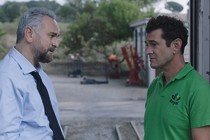The Caiman
- Now that the elections are over and Silvio Berlusconi lost, it is simpler, away from all the political controversy and prejudice, to see Nanni Moretti’s tenth film for what it really is
The Caiman [+see also:
trailer
interview: Jean Labadie
interview: Nanni Moretti
film profile] is not a film about Berlusconi, who certainly plays an important role in that he is an Italian phenomenon. The main character is a country that has lost its way somewhat, like Little Red Riding Hood, and is forced to live in a puppet theatre full of tragic stage tricks. And the characters in the film are its citizens and their personal stories: Italians, reflected in the grotesque mirror of Moretti’s imagination. The image may not be flattering, but it is an accurate resemblance.
This is precisely why Moretti’s film features the director’s three great passions – cinema, politics and, obviously, life – intersecting and superimposing upon another, as happens in real life.
The film also tells an intimate story: of the hard-to-accept end of a marriage and the profound relationship between a father and his children. It furthermore shows us what cinema is – rites, nostalgia, places, stories, budgets, box office earnings, even failure – and ultimately recounts an anomaly that conditioned and divided an entire nation.
Moretti’s favourite actor Silvio Orlando here plays a comical and tormented figure. He, who has always produced trashy films with unlikely titles, is approached by a young debut director (Jasmine Trinca) who has always wanted to make an anti-Berlusconi film. He hesitates, yet knows this is his last chance, as he’s been unemployed for ten years and is penniless and plagued by serious marital problems. Through the necessities of the film, its screenplay and its foreign producer (a magnificent Jerzy Stuhrz who says, "I like the idea of showing Berlusconi’s 'Little Italy', your continuous sinking to the bottom"), the most prominent and debated moments of Berlusconi’s life are reconstructed: his wealth, private television channels with half naked dancers, the Swiss bank accounts, his political beginnings ("Italy is the country I love").
To depict the film world, Moretti uses real directors in the most disparate roles: Giuliano Montaldo, Paolo Virzì, Carlo Mazzacurati, Paolo Sorrentino and Matteo Garrone. To depict Berlusconi, the director uses four different actors. He is a doll with a toothy smile when played by Elio De Capitani, practically the political leader’s double; a narcissistic caricature when impersonated by Michele Placido; and has the face of reality when Berlusconi appears in person in his show before the European Parliament or the judges in Milan.
And, ultimately, he has the disconcerting face of an icy and diabolical Nanni Moretti in the epilogue outside the courtroom where, after a five-year trial, Berlusconi received a seven-year sentence for corruption. Here, Moretti reflects on his country’s moral, cultural and political drift, on its more obscure and frightening side, expressing a dark distrust of the public sphere.
Moreover, he does so with anger but without certainty, sprinkling the film with doubts and reservations, and resorting to the metaphor of a child’s neurotic search for a Lego piece it cannot find, without which it will never be happy.
(Translated from Italian)
Did you enjoy reading this article? Please subscribe to our newsletter to receive more stories like this directly in your inbox.






















